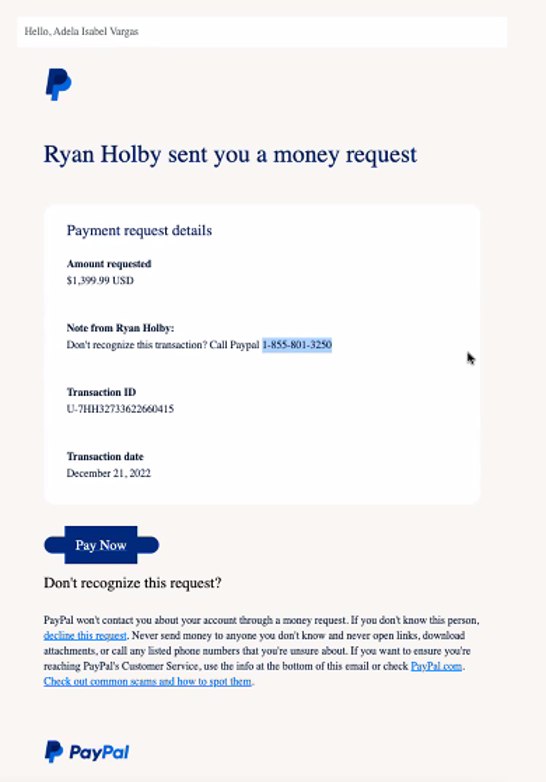PayPal Money Request Scam : PayPal Invoice and Money Request scams
These scams can happen in numerous ways:
- You receive an invoice or money request through PayPal, but for a product/service/crypto you never ordered. Don’t pay it.
- You receive an invoice or money request through PayPal, and the bad actor has included an alarmist note. The note asks you to call their fake customer service number.
- You receive a fake invoice or money request by email, designed to look like a real PayPal email.
These scams are trying to trick you into sending money to a fraudster or providing your personal or financial details to them. Be wary of any messages that are alarmist, warning you to call them quickly to resolve an “issue” on your account.
How to avoid this scam:
If you receive a suspicious invoice or money request, don’t pay it. And don’t call any phone numbers stated in the invoice note or open suspicious URLs.
Cancel any unwarranted invoices or money requests by logging in to the PayPal website or the PayPal app.
Phishing email/message
Received a suspicious email, or message or been directed to a fake website? Forward it to ph******@pa****.com and then delete it. We’ll investigate it for you.
Don’t reply, open links, download attachments, or call any listed phone number.

Advance fee fraud
If you get an offer for free money, there’s probably a catch. Typically, fraudsters will ask you to send some smaller amount (for taxes, for legal documents, etc.) before they can send you the millions you’re promised, but which they never intend to send you.
How to avoid this scam:
Don’t wire money to someone you don’t know.
Overpayment scam
- A customer sends a PayPal payment that is more than the purchase price of the order and then asks you to wire them the difference.
- They may tell you that they accidentally overpaid you, the extra money is for the shipping costs, they’re giving you a bonus for your great service or the money is for the stress they’ve caused you.
- They may even ask you to wire the shipping fees to their shipper.
- This scammer may have paid with a stolen credit card, bank account number, or checking account.
- Just because a payment has been deposited into your account, doesn’t mean the money is yours to keep. If the legitimate account holder reports unauthorized activity, the money can be withdrawn from your account.
- If that happens, you’ll lose the money you wired to the fraudster, the product you shipped, shipping costs, and your payment.
How to avoid this scam:
- Don’t wire money to someone you don’t know. A legitimate buyer won’t overpay you for an order.
- If a customer overpays you and asks you to wire them the difference, consider canceling the order—it’s very likely to be fraudulent.
- Don’t wire money to the bogus shipping company—it’s part of their scam to get your money.
Prize winnings
Messages asking you to pay a small handling fee to collect fabulous prizes are usually a scam. You send the handling fee and get nothing in return.
How to avoid this scam:
Don’t send money to someone you don’t know. A legitimate prize won’t require you to pay to receive it.
Be the first to comment